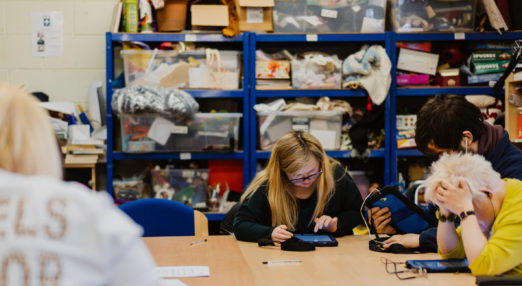National project shows digital inclusion is key to tackling health inequalities
Tackling the digital divide is crucial to reduce health inequalities, a three-year project trialling digital technology with disadvantaged communities has found.
Having internet access and digital skills are essential for people’s health and wellbeing today, according to the final report from the NHS’s Widening Digital Participation Programme.
The authors say that coronavirus (COVID-19) has further exposed the ‘digital divide’ – the links between digital exclusion and social and economic disadvantage. The report adds that the huge increase in the use of digital technology in healthcare during the first wave of the pandemic shows that the lessons learned from this project will be invaluable for the future.
They include a recommendation to create a network of ‘digital health hubs’, after several were set up through the project to build digital health literacy and improve access to services. The report also calls for further work to harness the benefits of digital inclusion, for example by supporting people to try out different devices and assistive technologies to boost their health.
Under the programme, delivered by NHS Digital, 23 pathfinder projects were set up throughout England between 2017 and 2020. Social change charity Good Things Foundation ran the pathfinders, which tested different ways of using digital technology to improve the health of the most excluded people in society.
A total of 285,164 people in total were reached, engaged or supported through this phase of the programme.
Pathfinders included one in Nailsea, Somerset, which created the first digital health hub; work with homeless people in Hastings where tablets were used to triage their health problems; and the Leeds Dementia Pathfinder, where people with the condition and their carers were loaned digital technology, bringing huge benefits to their wellbeing.
A scheme in Stoke-on-Trent where breast screening was promoted through Facebook led to an increase in uptake of screening, so the same techniques have now been adopted elsewhere in the country.
Further recommendations in the final project report included:
- That improved data on the links between digital inclusion, health care and outcomes should be collected
- That people’s digital health literacy should be improved, including supporting safe and healthy internet use
- That work to build digital skills in health and care staff should continue, and networks of digital health champions should be created
- That digital inclusion should be an integral part of health, care and wellbeing strategies
Nicola Gill, director of the Widening Digital Participation Programme at NHS Digital, said:
“The pathfinders were developed around the principle of going to where people are, whether that was a GP surgery, a homeless shelter, a dementia support group or a cancer support network.
“Being there, talking to people, drinking tea and learning about their lives allowed us to gain trust and valuable insights into what they really need.
“If NHS commissioners, policy makers and designers of digital health services and tools can do just do some of the things recommended in this report, then hopefully we can start to narrow the gap of health inequalities, and help people benefit from the choice and convenience they offer.”
Helen Milner, Group Chief Executive of Good Things Foundation, said:
“Using digital has become essential in order to reduce health inequalities. This three year project – which has reached over a quarter of a million people – shows that by understanding the barriers to access and taking services to the people, we can engage and support them like never before.
“During lockdown, people have felt lonelier than ever and have struggled with their physical and mental health. Digital Health Hubs, piloted and developed during the programme, have been able to tackle this by improving digital health literacy and the use of digital health tools in a safe, trusted space in the community.
“We hope that a future network of Digital Health Hubs and Digital Champions will further harness the benefits of digital inclusion. It is vital that digital is at the centre of health, care and wellbeing strategies in the future.”
Factbox
- 23 main pathfinders ran to test and learn how digital technology and community interventions can improve health and care
- 285,164 people in total were reached, engaged or supported through the programme
- 21,178 people were supported through the pathfinders. This includes 1,350 people who trained as digital health champions or peer mentors
- 263,986 people were reached, engaged or supported through the Good Things Foundation network of community partners, online resources and campaigns
Read the full report
-

Digital Inclusion in Health and Care
COVID-19 has changed the dial on digital and its role in health and care settings meaning the lessons learned and shared in this report could not be more...
